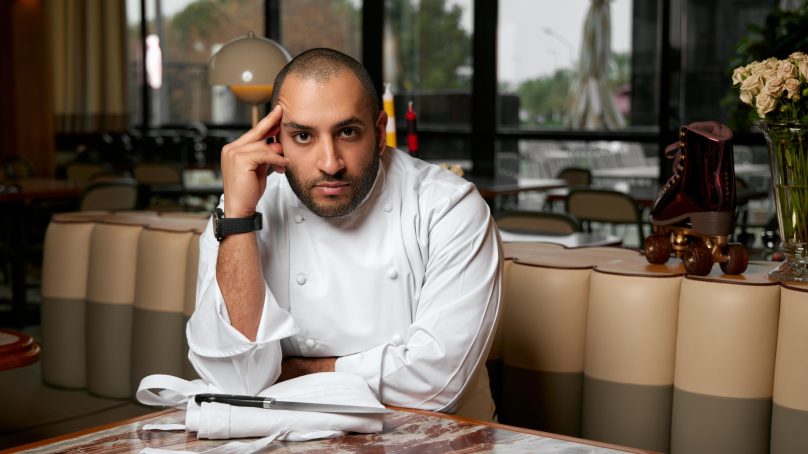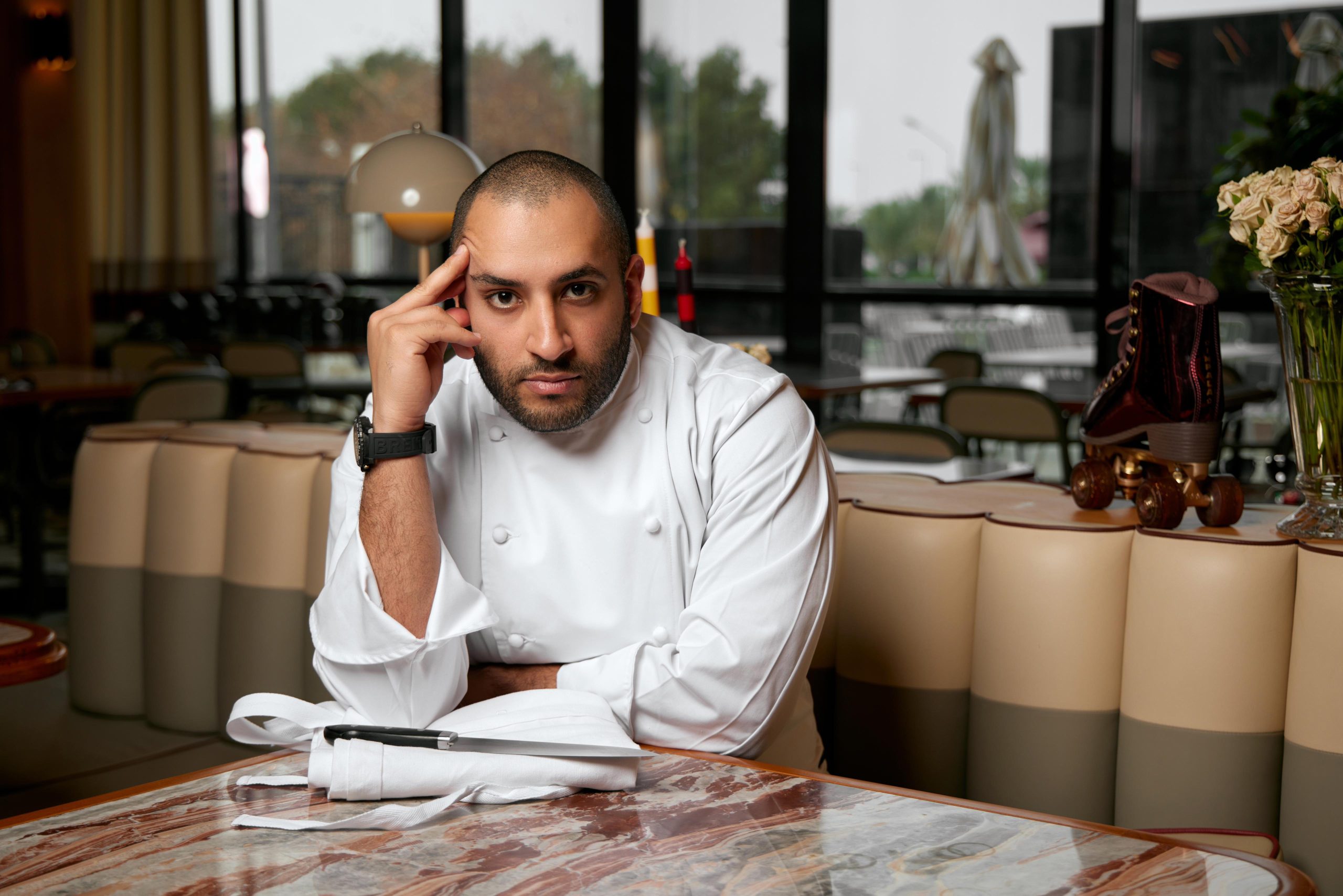Chef Faisal Al Nashmi, co-owner and executive chef of AlMakan United Co., has played a pivotal role in transforming Kuwait’s culinary scene. Not only has he redefined dining through innovation, storytelling and bold creativity; he has also inspired inspiring the next generation of chefs. We learn more about his achievements in this exclusive interview
How would you describe your restaurants?
My restaurants represent their creators, reflecting our journey. Furthermore, the culinary side of each menu embodies my thought process, experiences and personal growth. Each restaurant I open symbolizes a specific period in my life, evolving with time. Compare Street and Makan—the first launched in 2014—eclectic and bold. Flavors were daring and youthful, mirroring our energy as partners. The restaurant itself reflected our vibrancy, fearlessness and passion at that time in our careers. Over the years, the newer restaurants became classier, more refined and precise. Thus, they showcase our evolution as creators within the ever-changing F&B industry.
You emphasize the importance of storytelling in creating dishes in the kitchen. What can you tell us about this?
The importance of storytelling is something I learned years ago when I met chef Thomas Keller, one of my biggest idols. He is an American chef with a remarkable collection of Michelin stars and his influence on the culinary world is huge. During his visit to Kuwait, I had the privilege of meeting him at the grand opening of Bouchon Bakery. Since he owns Bouchon Bakery, his presence at the event was a significant moment for aspiring chefs and foodies. I still remember his words about memory and how crucial it is to connect food experiences with deeply personal memories.
Years later, his perspective remains fresh in my mind because linking a sense to another sense strengthens the emotional connection. Specifically, when you associate the sense of taste with memory, it stays with a person much longer than expected. This connection triggers nostalgia, making people recall childhood moments whenever they experience a flavor reminiscent of their past experiences.
By playing with senses, chefs create emotional experiences that make dishes more memorable and impactful for those who enjoy them. For this reason, I firmly believe storytelling plays a major role in shaping the emotional impact of a culinary creation. So, every dish must invite a person’s senses to interact, ensuring the experience leaves a lasting impression beyond the flavor.
When dining at a restaurant, the way a dish looks, feels, and smells influences perception beyond merely how it tastes. Thus, the multisensory experience becomes even more profound when it successfully evokes a specific cherished moment from the past. For instance, we once developed an ice cream designed to replicate the exact sensations people felt as children eating ice cream. We meticulously recreated details such as the wrapper’s texture, the sandwich’s feel and even the nostalgic colors of the packaging. These small yet powerful details transport people back to childhood, reinforcing the emotional connection between food and memory.
This is precisely why storytelling remains an essential tool in crafting culinary experiences that resonate deeply with diners.
You’ve previously mentioned wanting to change the status quo in the culinary industry. In what ways have you challenged traditional expectations and how have they shaped your success?
Changing the status quo in the culinary industry remains my core mission and aim. I believe that. every individual working in the F&B industry serves as a building block contributing to its overall evolution. Thus, introducing something new and innovative adds another building block to the existing structure, strengthening the foundation of the industry itself.
Kuwait represents the building, while each chef’s contribution adds another essential layer to its continuous development and transformation. For instance, when we first launched our restaurant in 2014, we significantly shifted the prevailing norms within the local F&B industry. So, by introducing something new, we laid the groundwork for future chefs, making it easier for them to introduce fresh concepts. For example, when we unveiled a menu completely different from existing norms, we demonstrated that innovation could thrive in this market.
Seeing our success, chefs realized it was possible, making it easier for them to push boundaries fearlessly. Over time, as more chefs embrace creativity, the entire industry naturally adapts and fosters continuous growth within the F&B landscape. I firmly believe our work contributed to a major shift in the market, just as influential chefs did before me.
Furthermore, pioneers like chefs Ahmed Al-Badr, Adla Al Sharhan and Maryam Alnusif laid foundational blocks that allowed me to build upon their efforts. Because of their contributions, I was able to climb higher, adding my own blocks to push the industry forward. This is how I view culinary progress as an ongoing cycle where each generation paves the way for the next.
As we continue developing, creating and opening innovative restaurants, we collectively drive the market’s evolution and expansion even further.
You’ve described cooking as deeply emotional and intertwined with personal experiences. How does this influence the way you design your menus and restaurant concepts?
I believe what makes us unique as an F&B group is our ability to consistently place ourselves in the past. This distinctive approach allows us to stand out from competitors rather than simply blending into an already saturated culinary landscape.so, if I merely followed existing market trends, I would inevitably conform to the same standards and menus as everyone else.
Furthermore, to differentiate ourselves, we must first trust our instincts and, secondly, establish a strong and recognizable character in our brand. Moreover, every restaurant today possesses a unique character because its foundation is deeply rooted in memory, storytelling, and individual personalities. These elements play a crucial role in shaping restaurant concepts, ultimately helping us develop and evolve in a meaningful way.
Years ago, during our first restaurant venture, we unfortunately learned this lesson the hard way through trial and error. Initially, we approached the market with an egotistical mindset, overlooking consumer needs and focusing solely on our creative vision. However, we quickly realized the importance of balancing our identity with customer preferences to achieve long-term success.
Thus, by refining our strategy, we created an equation that blended our character while addressing consumer needs and market demands. Moreover, this delicate balance allowed us to establish a new standard, which continues influencing the way we develop every restaurant.
At the forefront of this development, our identity and personal experiences have consistently shaped the evolution of our brand. Because of this commitment, our brands maintain individuality, allowing each concept to stand out with its own unique personality.
Looking ahead, how do you hope to shape Kuwait’s culinary scene?
Honestly, the more we embrace creativity, the more we evolve and the more we inspire others. I genuinely love teaching people, as sharing knowledge helps shape the next generation of chefs and strengthens the culinary industry. One day, I hope to have a dedicated platform where I can train aspiring chefs and nurture their creative potential. Providing this opportunity would encourage more individuals to develop an interest in the craft and refine their culinary skills effectively. Whether through a cooking school, an online course, or hands-on mentorship, I am committed to making this vision reality. Achieving this goal would elevate industry standards by attracting passionate, innovative chefs determined to drive meaningful change in the field.
Additionally, creating a platform would help chefs gain the respect they deserve, ensuring their voices are heard within the industry. Currently, the culinary scene remains undervalued, as many fail to recognize the dedication and expertise required in this profession. Chefs lack a proper platform to express their perspectives, making it difficult for people to appreciate cooking as a true craft. Unfortunately, many still view culinary work as mere entertainment rather than a serious and highly skilled professional career. For this reason, I strongly believe establishing a platform is crucial for giving chefs the recognition and respect they deserve. Whether through a culinary court, a chef’s club or an official ministry-recognized organization, chefs must have a legitimate voice.















